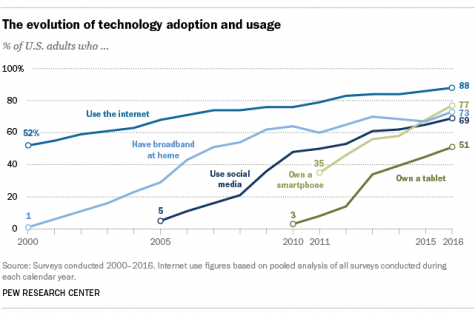Kumar: You could have just Googled that question about my culture
In this age of information technology, minorities and people of color may wonder if they are obligated to answer questions that could’ve been answered on the internet.
January 15, 2019
People often say, “There are no dumb questions,” but honestly, that’s not true. I find myself thinking about this a lot when people ask me things about my culture. With the rise of globalization and access to technology, when it comes to questions about other cultures, minorities and people of color should no longer be Americans’ only resource for information, if at all.
The world has changed a lot since I’ve grown up. In fact, we become more globalized and interconnected every single day. With this rapid globalization, there has been a spread of cultures, cultural fusion, and disbursement of knowledge. Because of this, the information that’s available to us in the U.S. about other countries and societies is abundant and readily available. As of 2017, the Pew Research Center estimates that 77 percent of American adults own a smartphone and 88 percent use the internet.

Compared with other countries, we are very privileged in the United States to have this access, and we should, honestly, capitalize on it every chance we get to better educate ourselves. To me, it seems like a no-brainer, but it’s easy to see how we can take it for granted because of its availability.
Our history and unique situation of being a melting pot has also given us the comfort of ignorance in thinking interactions with minorities and people of color are enough to be educated. As for lack of access to those in poverty or where technology is not readily available, that’s an issue of the lack of investment in education and public libraries, but it’s a different story.
This is not in any way trying to be hostile, it’s a genuine curiosity of why we don’t try to do more to educate ourselves when we have plenty of opportunities to do so. I do sincerely appreciate it when people want to know more about my culture. It’s why so many people of color and minorities on campus join their respective student organizations — to spread awareness and be a resource.
But when people ask questions and I have to answer them, it often feels like a justification for my existence and sometimes a burden. It begins to feel like that when people in my personal life ask basic questions when I’m just going about my daily business. The context in which questions arise matter just as much as how they are asked. There’s a big difference between asking me about the food at a cultural event versus asking me while I’m in the middle of eating lunch.
Complex issues, such as the recent protests of Hindu women in India trying to enter a temple, are definitely welcomed discussions that should take place because each person has a different approach based on experience. Discussions such as that are how we learn. However, if you call out Priyanka Chopra for having a “lavish” three-day wedding, when you simply could have searched “Indian weddings” and discovered that it’s pretty standard and has religious significance, then probably don’t ask me about it.
RELATED: Kumar: Representation in the media lacks true diversity
The line is really fine, and like most controversies, we have to figure it out together to see what works. It’s up to us to use the opportunity that we have in the U.S. to educate ourselves because we really don’t have any excuses. People shouldn’t have to feel as if their lives are abnormal because of our own discomfort or lack of knowledge. So by all means ask questions, but before you do, ask yourself, “Is this the right time?” and, “Could I just Google this?”






